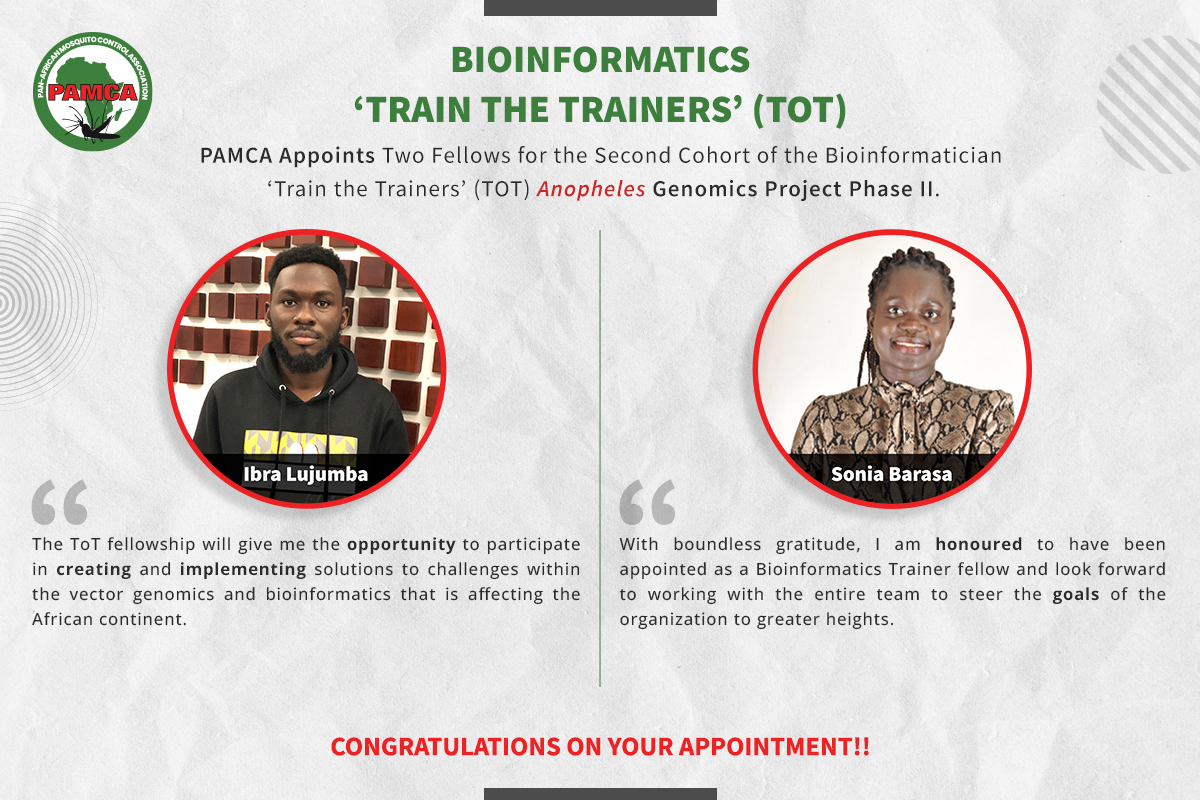PAMCA Appoints Two Fellows for the Second Cohort of the Bioinformatician ‘Train the Trainers” (TOT) Anopheles Genomics Project Phase II
On October 1, 2022, PAMCA welcomed two new recruits, Sonia Barasa and Ibra Lujumba to join the Anopheles genomics project phase II - building sustainable capacity in vector genomics and bioinformatics in Africa project as Bioinformatics Trainer of Trainers Fellows. This second cohort of fellows were recruited following successful petition from PAMCA to the Bill & Melinda Gates Foundation for supplementary budget to support the recruitment of additional personnel to support the program. The fellowship is tenable at PAMCA in partnership with its training partner, the MalariaGEN program at the Wellcome Sanger Institute, UK. This is a two-year fellowship split into two parts of remote learning and in-person secondment at the Wellcome Sanger Institute in the UK.
Upon completion of their fellowship training, Sonia and Ibra will help build the capacity in vector genomics and bioinformatics by providing bioinformatics training support to build the critical capacity required to support vector genomics work in the African continent.This fellowship program will have the added benefit of building the capacity of women in bioinformatics through deliberate recruitment and support for women candidates in the program.
Sonia Barasa is a Bioinformatics Trainer fellow for the Anopheles Genomics phase II project. As a Bioinformatics ToT fellow, part of her responsibilities is to participate in trainings and workshops of the Anopheles genomic phase II projects, review and design vector genomics and Bioinformatics’ curriculum for the training courses, and advance PAMCA-Sanger Institute’s goal to expand the capacity of vector genomics in Africa.
Sonia holds a BSc. in Biotechnology from Masinde Muliro University, Kenya, and a MSc. in Bioinformatics from the University of Nairobi, Kenya. During her master's studies, her research focused on the characterization of genetic variations in the phaseolin (α-Phs) gene and the encoded seed protein content at molecular level among selected common bean accessions.The insights of her project are polymorphisms that are associated with seed protein content, that influence the nutritional quality in bean grain foods.
Her research interests focus on understanding the key drivers in insecticide resistance in vector control strategies, the role of evolution in vectorial capacity, application of Bioinformatics tools to understand microbe –mosquito interactions, molecular marker and signature identification, and Database management systems.Prior to joining PAMCA, Sonia served as an innovation fellow with C4Dlab in collaboration with UNICEF which aims to build digital tools/instruments to harness skills among youths using design thinking.
Sonia´s Thought on the TOT Fellowship
The ToT training is an opportunity for me to develop my skillset both in genomics and Bioinformatics in an environment of highly qualified multidisciplinary experts and mentors.This training will also give me the opportunity to discover my talents and abilities to give back and contribute to the field of Bioinformatics and vector control. I am deeply touched and inspired by the dedication and work the team at PAMCA is putting in towards achieving an Africa free of vector borne disease. With boundless gratitude, I am honored to have been appointed as a Bioinformatics Trainer fellow and look forward to working with the entire team to steer the goals of the organization to greater heights.
Ibra Lujumba is a Bioinformatics Trainer (ToT) Fellow for the Anopheles Genomics Phase II project at PAMCA. As part of his responsibilities, Ibra would advance PAMCA-Welcome Sanger Institute's goal to expand bioinformatics capacity for vector genomics work in Africa.Ibra holds a BSc in Biochemistry and Chemistry from Makerere University, Uganda. Ibra has always had a keen interest in Bioinformatics and understanding the dynamics of human-parasite-vector interactions, human genomics as well as genomics of African indigenous cattle.These interests fit into the wider perspective of studying existing challenges of increasing drug resistance, poverty rate and food insecurity due to climate change.
His research interest focus on understanding the growth dynamics of wild-type trypanosomes in humans and cattle, identifying variants that are responsible for observed tolerance to trypanosomiasis among indigenous cattle living in tsetse fly-endemic cattle corridor in Uganda. Prior to joining PAMCA, he served as a member of H3Africa two bioinformatics working groups that are studying transcriptomics and repeat expansions using Africa-wide human genomics datasets.
Ibra`s Thought on the TOT Fellowship
The ToT fellowship will give me the opportunity to participate in creating and implementing solutions to challenges within the vector genomics and bioinformatics that is affecting the African continent.This will also give me to opportunity to further deepen my skills and capacities as a trainer of trainers in bioinformatics that would eventually develop bioinformatics expertise in Africa to allow African scientists to address research questions in biomedical science and agricultureI am looking forward to expanding my network & collaboration with partners & institutions across the continent during my ToT fellowship with PAMCA.

